Encouraging the Church in world mission



03 - Editorial
04 - Your skills: Tools in God’s hands
06 - Perspective
07 - GO! News of Africa’s mobilising Church
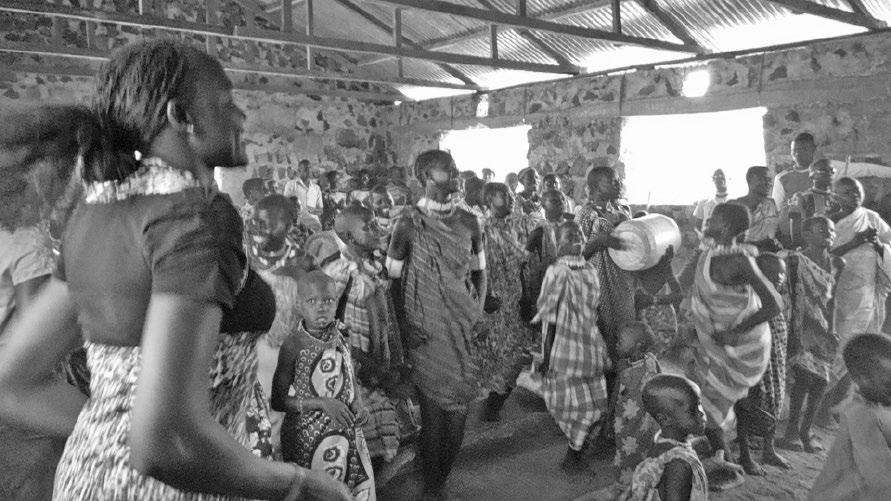

08 - Why we GO - People Groups
Cover: In Malawi some Christians take a negative view of sports. But after the Sports Friends ministry visited her church, Jane got involved as a netball coach. Many of the girls she coaches have given their lives to Christ. (Photo by Erin Kranz)
The views expressed in the various features in this magazine are not necessarily those of the publisher.

© 2016 AFRIGO AFRIGO is a quarterly publication aimed at raising awareness, mobilising, training and inspiring churches and individuals in Africa towards global mission.
Editor: Suzanne Green
Design: Shelbey Hunt
Stock photos are occasionally used. Pseudonyms are used when there are security concerns.
AFRIGO: info@afrigo.org
AFRITWENDE: afritwende@afrigo.org
ALLONS-Y ! : info@afrigo.org
AFRÍDE: afride@afrigo.org
SIM East Africa:
Tel: +251 911 206 530 east-africa.office@sim.org
SIM West Africa:
Tel: +233 30 222 5225 wamo.personnel@sim.org
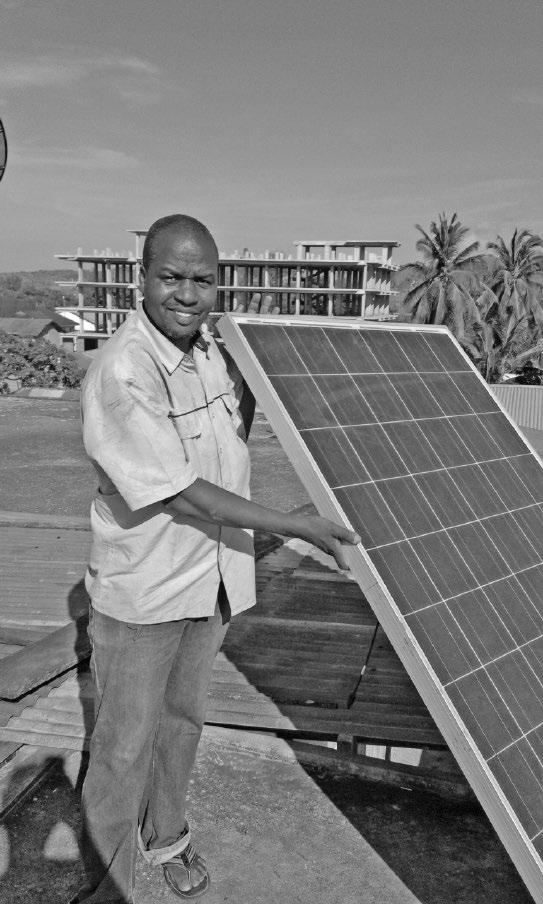
SIM Southern Africa:
Tel: +27 21 715 3200 za.enquiries@sim.org
AIM International amc.io@aimint.org www.aimint.org/africanmobilization/
Many people use their gifting or career for the sake of the gospel. Read about a netball coach, a veterinarian, a businessman and an architect who use their skills for missions.
Perspective: What if God calls you to be an architect?
False dichotomies tell us that those in secular professions or vocations do not have a calling and are not involved in Christian service.
In support of mission, and with a view to greater cooperation, 60 Christians gathered in Addis Ababa in October for the LausanneOrthodox Consultation.

Servant-hearted gospel workers can serve the Toposa people of South Sudan and Ethiopia through professional skills in medicine, veterinary medicine, agriculture and
“Now the LORD spoke to Moses, saying, ‘See, I have called by name Bezalel, the son of Uri, the son of Hur, of the tribe of Judah. I have filled him with the Spirit of God in wisdom, in understanding, in knowledge, and in all kinds of craftsmanship.
“And behold, I Myself have appointed with him Oholiab, the son of Ahisamach, of the tribe of Dan; and in the hearts of all who are skillful I have put skill, that they may make all that I have commanded you.” (Exodus 31:12; 6-7).
Many people see their gifts and skills simply as means to a livelihood, a means to an end – our own end. Selling our skills to earn a comfortable living, provide for our family and live the good life is a common ambition. There’s nothing wrong with ambition. The question is whether we are made simply for our own enjoyment or for something greater. Is our skill only for sale, or is it for worship?
In Exodus God instructs Moses to build a tabernacle where his presence could dwell and around which his people could worship Him. The work would require significant materials, but also a high level of skilled craftsmanship. How was Moses to get that? Well, God had an answer.
Several lessons from this passage are relevant to missions today. First,
God is the initiator of all his work in and through us, and He is the giver of all skills and gifts – even those that we might think we have acquired. Indeed Bezalel and Oholiab worked hard to become skilled craftsmen. However, the Lord said that He had not only called them and appointed them, but that He had given them the ability to acquire those skills: “I have filled him with the Spirit of God in wisdom, in understanding, in knowledge, and in all kinds of craftsmanship.” (Exodus 31:3).
Then God provided for others with skill to join this work. Finally, God’s people had a heart to give for the needed materials. Both Bezalel and Oholiab, as well as the children of Israel, recognised that God’s gifts and the skills were not meant for acquiring more for themselves. They were meant for worship and for building God’s tabernacle.
The Lord is still calling people with diverse skills to engage in his work of building human tabernacles, the dwelling place of the Holy Spirit. He gifts people with diverse spiritual gifts and all kinds of knowledge and skill for this work. He uses those with abilities in medicine, engineering, accounting, theology, education, law, construction, agriculture, plumbing, nursing, computing and others! These skills have come from the Lord so that each of us may use them to make Him known. They can be turned over to the
Saviour for the sake of those who will otherwise live and die without ever hearing his good news.
Twenty-one years ago, my wife, Joanna, and I chose to put our skill in medicine at God’s disposal for his global mission. We have been blessed to see God use such little offering in the life of patients and their families in a mission hospital in a predominantly Muslim country. We have seen the door to a 100 percent Muslim village open to the gospel because of the gift of medicine. We have seen young men become disciples of Jesus – and now they are carrying the gospel to others.
Many who still live without the light of the gospel will not welcome a traditional missionary, but they will welcome a skilled professional. Many of those who brought us the gospel are themselves professionals.
The only skill that God cannot use is one that has not been surrendered to Him as an act of worship. Let us today offer Him our gifts and skills for his global mission.
Rev. Dr. Joshua Bogunjoko SIM International Director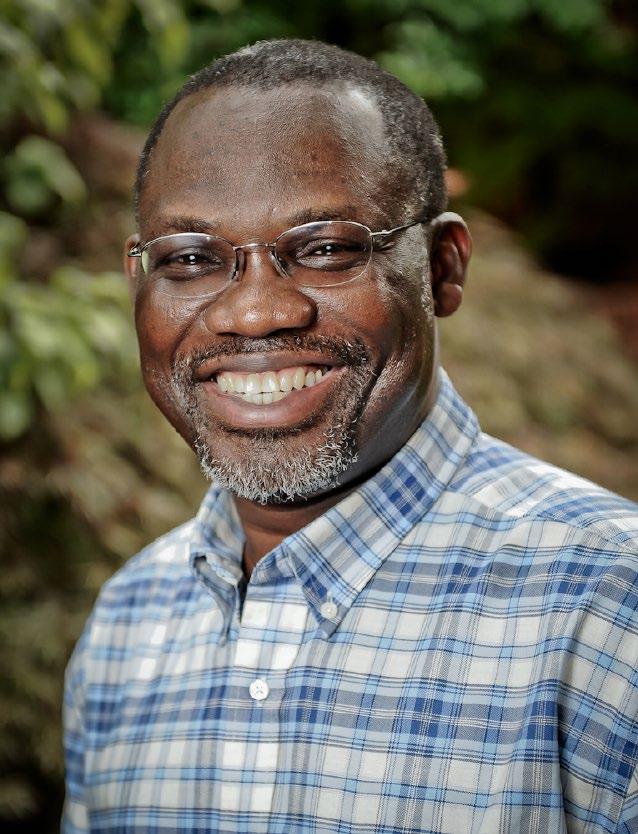
Dr. Bode Olanrewaju is a veterinary doctor and mission ary with CAPRO. He uses his profession to reach those who have been closed to the gospel in Northern Nigeria.
It is a great honour to use the skills of veterinary medi cine to serve the materially poor, whose livelihoods revolve around livestock. It has enabled me to model Christ’s love and compassion in a tangible way.

My veterinary help to the Fulani people is a bridge to start conversations, as barriers of mistrust and negative stereo types are broken down. Everyone responds to love, if we can only strike the chord in their hearts. Fulani hearts are reached as we care for their herds.
Almost every rural household has a chicken. In fact, chick ens have been described as the ATM of the poor. But when diseases hit, flocks and herds are decimated.
So we train indigenous people and missionaries as com munity vaccinators. This has given us greater access to households, and has improved goodwill. Some share very intimate details about their lives as they see the love of Christ demonstrated.
Testimonies such as, “I paid my children’s school fees by selling local chickens” abound among those benefitting from the programme supported by Tearfund UK, our longterm partner. The improvement in local chicken production has resulted in improved livelihoods.
Netball coach Jane Banda serves with Sports Friends, a SIM ministry that uses sports as a tool for transforming lives with the gospel. She is from Malawi, where many Christians would never dream of using sports as a ministry tool.
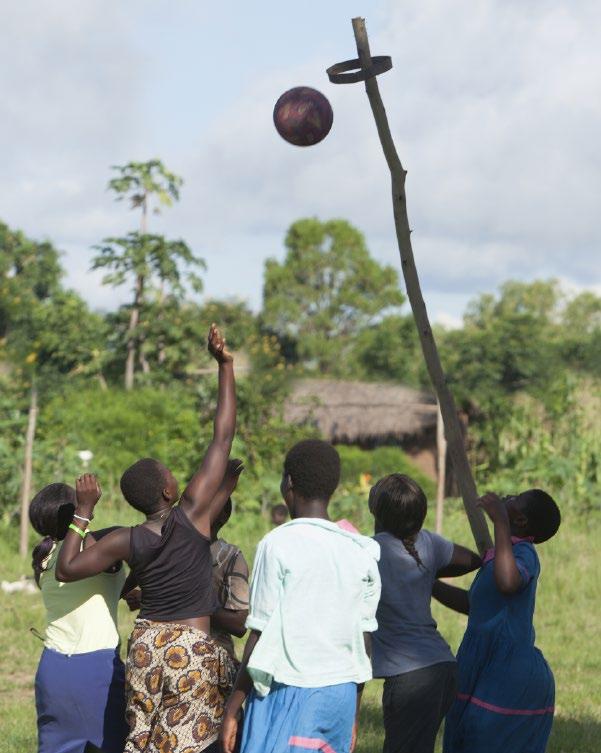
One day Sports Friends Malawi was introduced at Jane’s local church. She had stopped playing netball, because it was causing disunity with her parents. They believed that allowing a girl to participate in competitive sports would eventually result in losing her, perhaps to prostitution.
Sports Friends Malawi was able to give them new information, and they decided to allow Jane to participate in sports. Now she is one of their most reliable netball coaches, and leads her local church-centred netball team.
Many children love Jane and her sports ministry. Several of the girls she coaches have given their lives to Christ, and are part of the church. Her parents are happy now because she is being used to reach the community for Christ.
Jane’s story reminds her of the Scripture that says, “The stone rejected by a builder one day became the cornerstone.” Sports, which was considered useless and could lead to bad behaviour, is now seen as a great tool to help with life change!
Indeed Jane is a tool in the hands of God. She is now more active in her church and is making an impact in her family. She also has the joy of seeing members of the community come to faith.
A Muslim who refused to even greet an indigenous mis sionary changed his mind when he saw that the chickens vaccinated by the missionary did not die during outbreaks of disease. He came and asked us to vaccinate his flocks!
Today veterinarians, doctors, IT specialists and others are desperately needed to use their skills to support church planters, and provide relief to communities ravaged with poverty. Even a short engagement in mission could make a huge difference.
support. And some of the prayer group members left. I began to think it was better to quit – after all, I could preach and share the gospel at home, as well as running my business.
But one day when I was reading my Bible, God showed me how Paul used his skills in ministry. The Lord said to me, “You can still serve me in this village. You can overcome the barriers and challenges if you obey and use the skills I gave you.”
“Thank you, Lord. I know how to run a business. Is it possible to start a business here, and continue to reach the goals?”
With a small amount of capital, I set up a shop, where I sell solar panels and drinks. I charge phones and batteries and have a haircutting salon. After a few months, I made many friends. The villagers stopped thinking of us as enemies. There was no electricity, but they could charge their phones or buy a small solar power system at my shop.
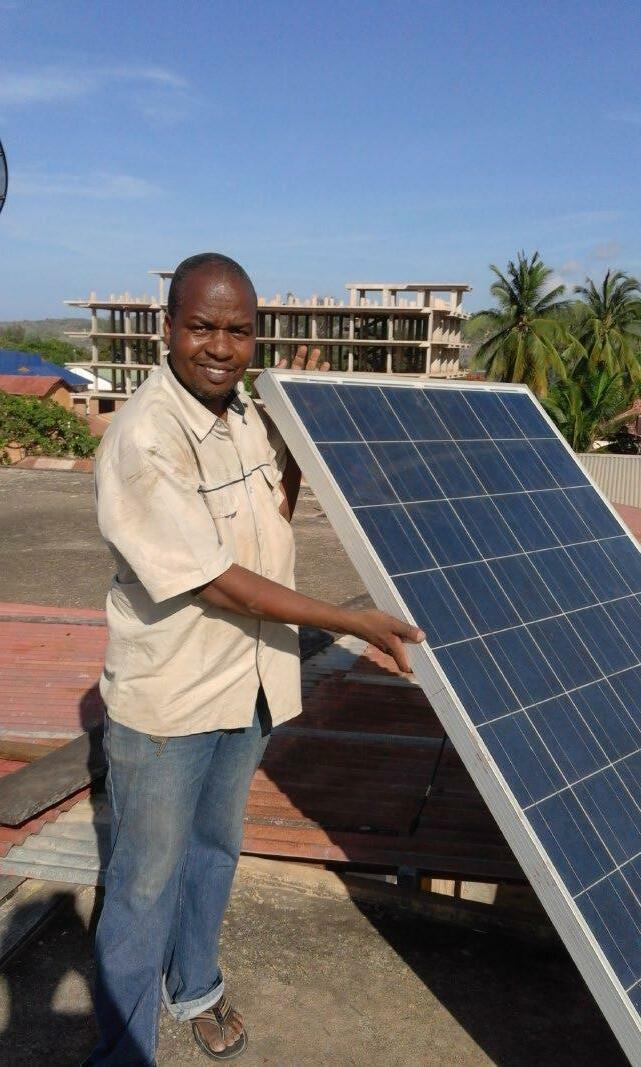
The mosque leaders told me they wanted to buy a solar power system and they wanted me to install it. So I did this, and put Scripture verses in all the bulbs I installed.
Running a business removed many of the barriers we had faced, and helped us build a strong bridge to reach the tribes in our area.
Architect Titus Oludotun Kumapayi is the Director for Mission and Evangelism for the Church of Nigeria Society, Anglican Communion. He has an architectural firm in Ibadan, where he lives with his wife, Margaret.
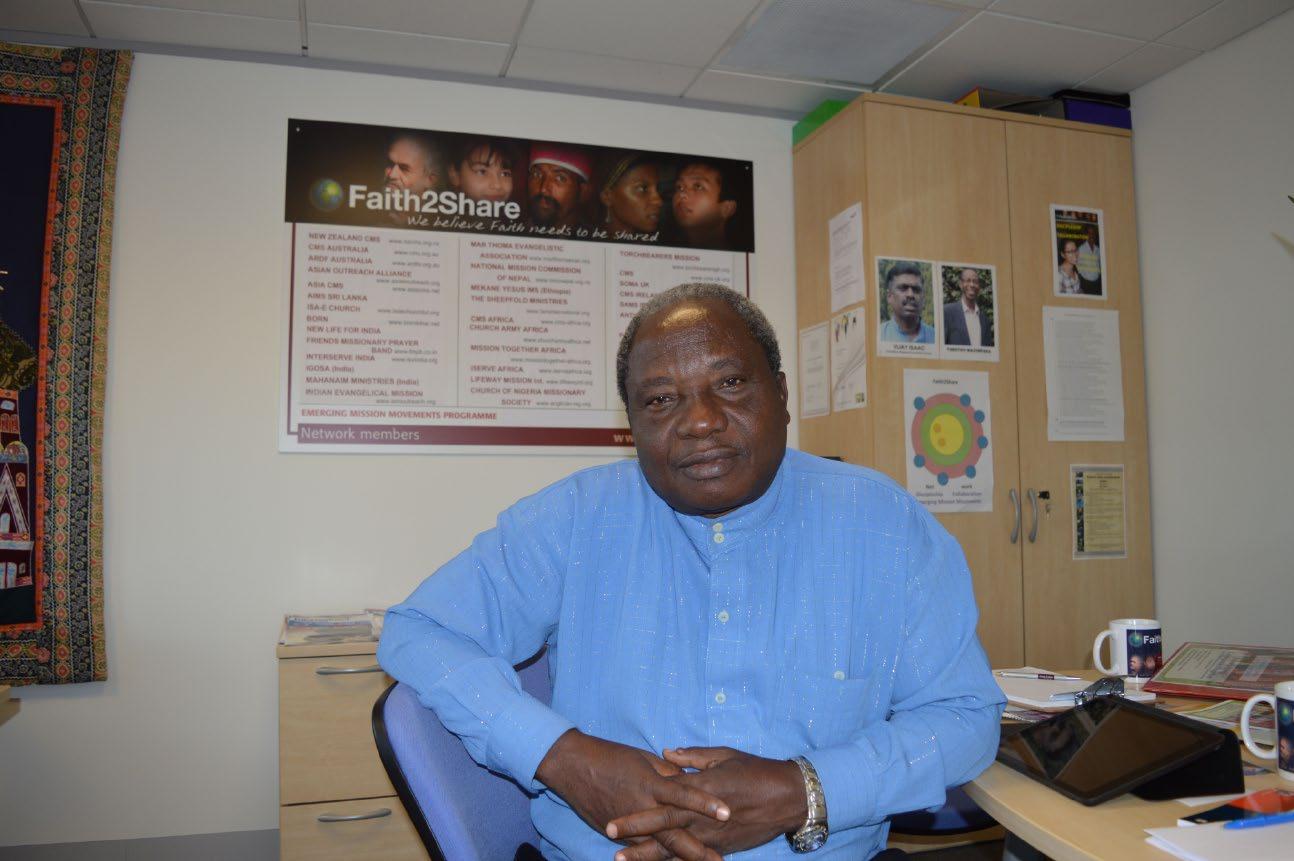
In 1991, during a training session at Haggai Institute in Singapore, I had the conviction not to take church ordination but to sit at my architectural table and use my training for evangelism, soul winning and discipleship. So in my office each day began with 30 minutes of prayer and Bible exposition. As the fellowship grew, some of the staff members came to me seeking counsel about their choice of career and spouse. Before long the impact of the staff fellowship started rubbing off on the workers in terms of their commitment to duty and supervision of projects. The firm started attracting Christians who desired the best for their projects.
Once, when we were supervising a government project, one of the builders from the Islamic faith approached me and commented about the grace and poise with which our work is carried out. There and then he opted to give
Because the workplace is where most of us spend most of our time week after week, it provides a unique opportunity for ministry.
In my years of working with students, several asked me for counsel as they prayed and fasted about starting a church or joining a mission agency. Sometimes I’d ask, “What if God calls you to be an architect or engineer?” They would reply, “But that is just a job.” They’d remind me of Ephesians 4:11, which is used to emphasise that “real” ministry or service is what is done by apostles, prophets, evangelists, pastors and teachers.
I would explain that the purpose of the various ministry gifts is to equip us for works of service. While some will be called to be pastors, evangelists, or missionaries, most of us will be teachers, businesswomen, technicians or administrators – among others.
Many people think serving God is only done in church or on the mission field. But the gifts listed in Ephesians are not the only ways to serve. Others, such as encouragement, generosity, showing mercy (Romans 12:8) or helps (1 Corinthians 12:28) are equally important.
“We are God’s handiwork, created in Christ Jesus to do good works, which God prepared in advance for us to do.” (Ephesians 2:10). So our professional callings are pre-ordained to be spheres of service to God. If we don’t appreciate this, we have probably
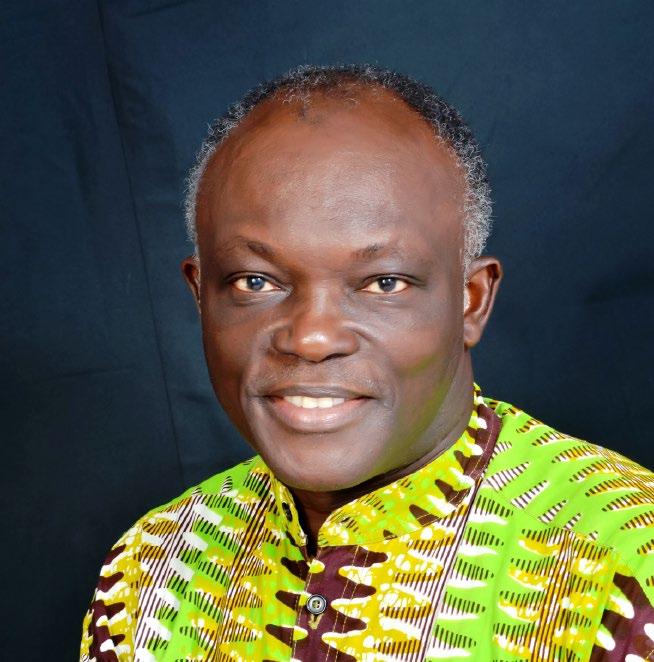
been influenced by one or both of two unhealthy dichotomies.
The first makes an undue distinction between clergy, missionaries and theological educators and the rest of God’s people who are in secular ministry. Hence, those in professional callings are perceived to be in secular service, not Christian service.
The other emphasises ministry contexts. Some people think Christian service is done primarily in Christian meetings, not in the public arena. They say pastors, evangelists, and missionaries have a calling; mechanics, doctors and economists do not.
Consequently, some believe we are only accountable in the so-called spiritual arena. And yet what we consider to be secular has significant implications for mission and transformation. For example, politics is not mere secular politics when ungodly government obstructs justice for the poor or forbids freedom to proclaim the gospel.
We need a Hebraic worldview of all of life as sacred. In the Old Testament God shows his interest in how governance, agriculture, architecture, industry and marketing are done. There were sacred guidelines for international relations, social engagement and all aspects of life that we categorise as secular today!
I suggest three reasons, among many, why it is so important to serve God through our professions. First, this is God’s world and He is concerned with how it is managed. Just as He
gave Adam the responsibility to tend the Garden of Eden, He calls us to be stewards of all creation through our professions.
Second, our professional workplace is a unique context for bearing witness to others. We not only do this by sharing tracts, but also through our commitment, due diligence, hard work and efficiency. Our work is to be done “as unto God”. In the Scriptures, Joseph served God’s purposes as an economic manager of Egypt; David as shepherd and King in Israel; Nehemiah as cupbearer to a King; and Lydia as a dealer in purple cloth.
Third, workplace disasters caused by carelessness, indifference, greed or corruption call for a deeper appreciation of God’s expectation that Christians will serve his purposes through their professional skills. Loss of life caused by engineers who approve structurally defective facilities or pharmacists who sell expired drugs highlights the need for Christian professionals.
When faithful Christians serve God through their profession the Lordship of Christ is brought to bear on all spheres of life.
Femi B. Adeleye is Executive Director of the Institute for Christian Impact in Ghana and Associate Director (Africa) for Langham Preaching. Previously he worked for World Vision and, before that, spent 32 years working with the International Fellowship of Evangelical Students. He is married to Affy, and they are the parents of four children.

people were baptised after follow-up teaching, and 78 backslidden Christians repented and returned to the Lord.
SIM’s East African Office and the Ethiopian Kale Heywet Church work hand in hand to respond to God’s voice, sending out those who say, “Here am I, send me”.
In February 2015 Coulibaly started attending a weekly ministry led by Joshua Ngunta, a missionary from Nigeria. It was held in a large city, and Coulibaly came from the countryside. The study drew a collection of people interested in learning about the Bible.
Sixty Orthodox and Evangelical church leaders, theologians and mission workers gathered 11-14 October 2016 in Addis Ababa, Ethiopia for the Lausanne-Orthodox Initiative (LOI) Regional Consultation. In support of mission and with a view to greater cooperation, they took part at the invitation of Ethiopian leaders from both traditions.
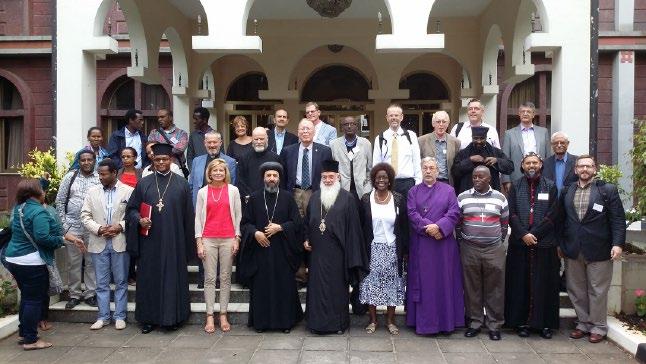
The 2000-year-old churches live in the midst of great opposition and persecution from other faiths. More than 50 Orthodox believers from Ethiopia and Egypt have been martyred in the past two years. A majority of those present came from Ethiopia, with further regional representation from Egypt, Eritrea, India and Kenya.
Delegates expressed a commitment to supporting those in Ethiopia with a vision to participate in God’s mission, and there was an emphasis on encouraging the development of mission-minded leaders within the respective traditions. With this aim in mind, an LOI consultation is being planned for 5-8 September next year in Cambridge, England. Go to: http://bit.ly/2e3yqPE for more information.
Sent from Ethiopia, Zeleke and Kebebush and their children serve in Pakistan, with a passion for the lost and the poorest of the poor.
They have been pouring their time into reaching out to an impoverished rural community. After engaging the help of the local church, Zeleke started to make contact with the people. Twice a week he travelled 20 kilometres in order to reach a group who had never heard the gospel. Kebebush started a women’s Bible study. She and the local women spent time cooking together, and sharing life and the gospel of Christ over cups of tea. The couple’s children have taken opportunities to share their faith with school friends. Once God opened the door for Zeleke to speak at the school opening programme. All who attended heard the good news, and many were influenced by it.
During the past four years, the Spirit of God has moved mightily through Zeleke and his family, through healing, deliverance and teaching. This has resulted in 15 house churches and 20 evangelism centres. Giving their all, they have served in one of the world’s most challenging mission fields. As a result of accepting this privilege, they have seen amazing answers to prayer: 1,000 people heard the gospel, and 385 received the good news of Jesus. Forty-eight
On his second visit, Coulibaly professed his sincere belief in Jesus. So dramatic was his conversion that he immediately asked Joshua if they could go to his village to proclaim the good news that is found only in Christ. “My ministry partner and I were reluctant to go,” says Joshua, “but he persisted, so we chose a date to visit his village.”
By God’s grace, the village warmly welcomed Joshua and his ministry partner. The church there has grown under the leadership of a local Malian pastor, and the people have reached out to another nearby village that had no church. A group of seekers has been meeting in this second village since December 2015.
“We have seen the work of the Holy Spirit there,” Joshua comments. “In one outreach we saw 30 young people and one adult give their lives to our Lord Jesus Christ. We are trusting the Lord to send someone to care for the new believers and start a church in this village.”
We jump to 12 pages, and take a look at prayer, which is absolutely vital to fruitful mission. Missionaries pray for guidance about where and how to serve. We soak all of our efforts for the Kingdom in prayer And we do battle as we pray – breaking spiritual strongholds so God can set people free.
Do you have questions about this theme or other missions topics? What issues would you like AfriGO to cover? We welcome your input, so that we can make the magazine as relevant and comprehensive as possible. Please email info@afrigo.org with your questions and ideas.
The Toposa are a large agropastoralist people group with an estimated population of 500,000. They live in three counties in the East Equatorial State (EES) of South Sudan –Kapoeta North, East, and South –and also in neighbouring Ethiopia.

The people rely on cattle, sheep and goats. Boys are given care of goats and sheep, and graduate to looking after cattle when they come of age. During the wet season the animals graze near the villages. When the rains end, the men take the herds to dry season pasturage, then lead them back when the next rainy season starts.
Sorghum is the main crop. The Toposa also pan for gold and other precious minerals in the stream beds.
Every major social event involves cows being given as a payment or promise. This can place pressure on relationships between neighbours, when there are not enough cows for
the dowry (bride price) of the first wife. Hence the tribal reputation is one of fierce cattle rustling among most neighbouring tribes. As warriors, the Toposa’s allegiance has been open to the highest bidder, especially during the 50 years of civil wars.
Political organisation is not apparent, although respect is paid to elders, chiefs and wise men. Most decisions about the clan or community are made in meetings attended by the men. Women remain at home farming, cooking and raising children.
The Toposa culture is orally transmitted through songs, dance, music, poems and folklore. Recently, improvements have been made in health care, water supply and veterinary services. Many Toposa children now attend school, but the literacy rate remains low. Women are starting to take a more prominent role in resolving disputes.
The people believe in a supreme being and in ancestral spirits, who may assist in
• Send missionaries with agricultural, medical and veterinary skills to reach out to the Toposa people.
• Provide translators, so that the people will have the full Bible in their mother tongue.
• Provide gospel workers who are skilled in oral Scripture sharing.
• Help the Toposa maintain good relationships among themselves and neighbouring peoples.
overcoming problems such as drought or epidemics of disease among their herds. These beliefs are patched together with Catholic catechism, with charms and animism completing their spiritual awareness.
The number of professing Christians is less than one per cent. Missionaries have used a discipleship model of oral Bible “storying” that has been taught to key leaders. The movement started by these pioneers is now beginning to multiply. Servant-hearted people with professional skills in areas such as medicine, veterinary medicine, agriculture and water development will find avenues for effective outreach among the Toposa.
Some portions of the Bible have been translated into their language.